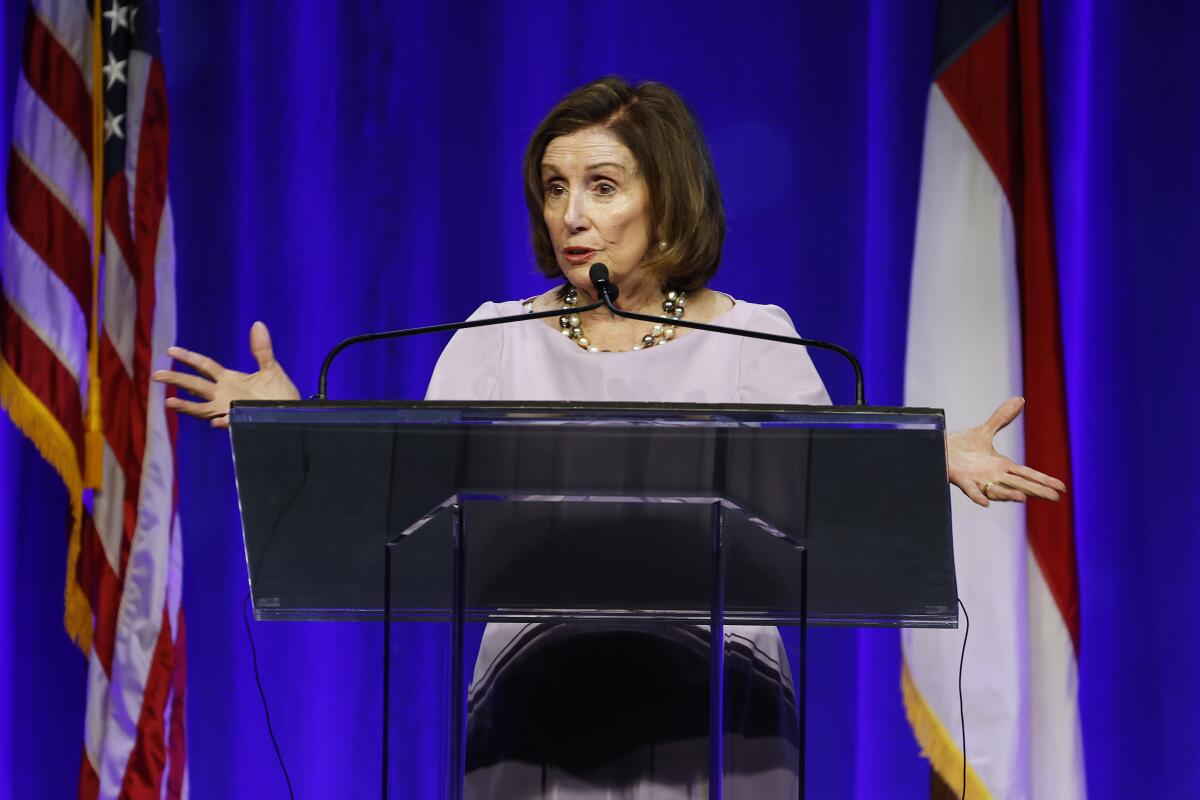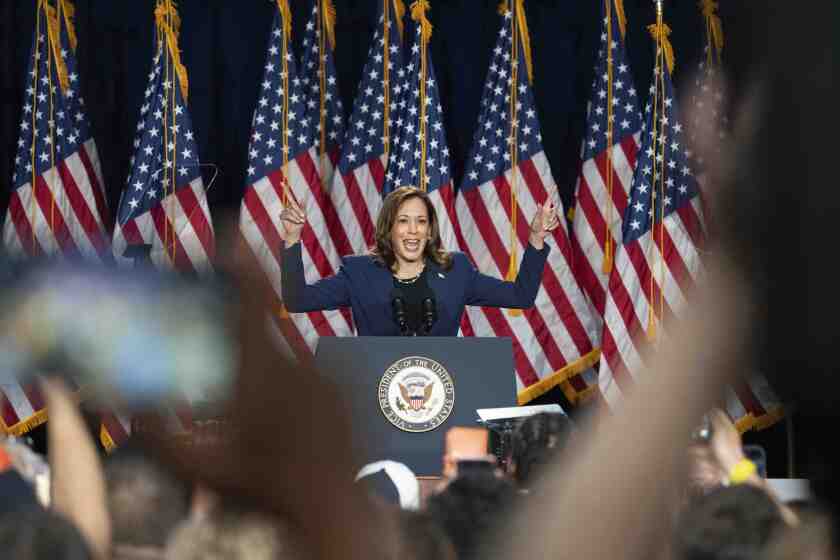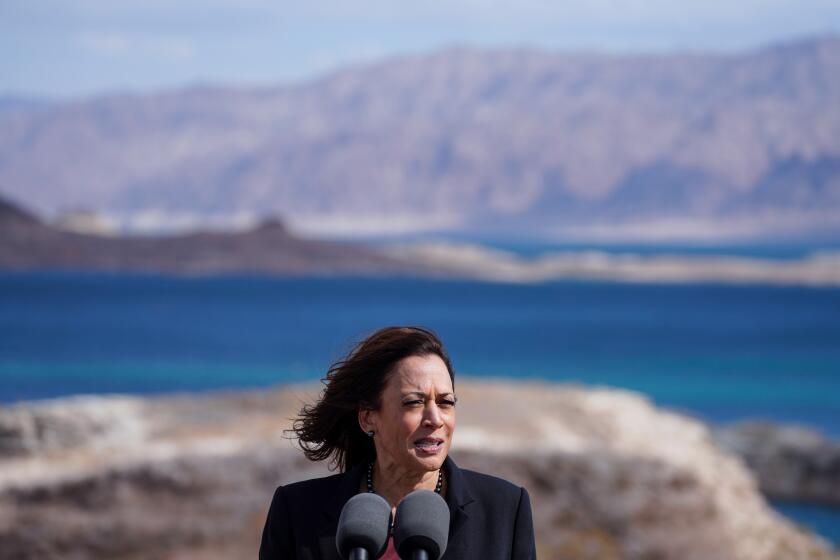Public deference, private power: How Nancy Pelosi navigated the Biden withdrawal

- Share via
Former House Speaker Nancy Pelosi, a Democratic juggernaut, navigated a careful, respectful line in her public approach to President Biden’s decision about whether to seek reelection.
The San Francisco congresswoman, known for her ruthlessly effective political instincts, never overtly called for the president to bow out of the 2024 campaign after a disastrous debate performance that solidified concerns about his cognitive and mental fortitude. However, once Biden withdrew from the race on Sunday, Pelosi wholeheartedly backed Vice President Kamala Harris to be the Democrats’ White House nominee.
“We should be so proud of our accomplishments, of the Biden-Harris administration and the Democrats in Congress,” Pelosi told California’s Democratic National Convention delegates Monday night as she made a motion to select Harris as the party’s presidential nominee.
“I make a motion tonight, recognizing the excellence, the determination, the patriotism, the prospects for the future, the pride we take and the joy we have, and the candidacy of Kamala Harris,” Pelosi said, according to a recording of the Zoom meeting of delegates. “I make a motion for our members to support VP Kamala Harris for president of the United States.”
Vice President Kamala Harris heads to Wisconsin as the Democrats’ likely presidential nominee, with actor George Clooney’s endorsement in her pocket.
The California delegation — with nearly 500 members, the largest of any state — unanimously voted for Harris, a major step toward the vice president appearing to clinch the number of delegates necessary to secure the party’s nomination. The official party nod will be formalized at the Democratic convention in Chicago next month.
For Pelosi, who has served in the House since 1987, the moment was her greatest embrace of Harris. Despite the women sharing Bay Area roots, they have never been as close as some politicians from the region. But Pelosi also faced tough head winds over Biden’s presidential reelection bid. Though she relinquished the House Democratic leadership in 2023, Pelosi wields a nearly unparalleled amount of power in her party and cares deeply about her party’s strength in Washington.
While Pelosi was respectful of allowing Biden, a fellow octogenarian, to make his own decision about the best path forward for his party and the nation, she was also cognizant of the impact the president’s decision would have on critical congressional races that will decide control of the House, notably in California. Control of the House of Representatives likely runs through the state, including crucial races in Orange County and the Central Valley.
“The House and Senate members freaked out about the debate, freaked out about the lack of a plan, freaked out about Biden losing in their districts. They were like, ‘We can’t sustain this because we can’t afford to and still win,’” said a source close to Pelosi who requested anonymity to speak candidly. “We don’t have that kind of margin of error. That sent tremors through the caucus.”
A growing drumbeat of Democrats had called for Biden to end his reelection campaign, and if he hadn’t announced he would do so over the weekend, many more members of Congress were expected to go public with their concerns about his candidacy this week, according to multiple sources.
“As bad as people think this is, the pressure was there. There were dozens more members about to do something this week,” this person said.
Pelosi, according to a second source close to the congresswoman, made a point of being deferential to the president while serving as a sounding board for other concerned Democrats.
“I would say it’s important to note throughout all of this, Speaker Pelosi was taking calls, not making calls,” this person said. “She was not initiating conversations.”
Harris, a Californian who calls climate change an ‘existential threat,’ has prioritized investments in clean energy jobs and environmental justice.
“People had a lot of concerns and she felt like she was in a position where she could hear them out because people were coming to her,” said this person. “I think that’s sort of what her role was. She was the person people came to for advice.”
She reportedly told congressional candidates in tight races to make whatever decision best fit their needs and the political leanings of their districts.
After Biden said this month that he was “firmly committed to staying in this race,” Pelosi made comments on MSNBC that suggested she was wavering about his prospects.
“It’s up to the president to decide if he is going to run,” she said on “Morning Joe.” “We’re all encouraging him to make that decision. Because time is running short.”
“I want him to do whatever he decides to do. And that’s the way it is. Whatever he decides, we go with,” she said.
A few days later, Rep. Adam B. Schiff of Burbank — one of Pelosi’s closest allies and a prominent member of Congress — called on Biden to drop out, a statement viewed by many political operatives as blessed by Pelosi.
Both sources who spoke to The Times said that Pelosi was unaware of Biden’s decision to not seek reelection before he announced it Sunday, and that she learned of it when she was at a private event in New Jersey.
More to Read
Get the L.A. Times Politics newsletter
Deeply reported insights into legislation, politics and policy from Sacramento, Washington and beyond. In your inbox three times per week.
You may occasionally receive promotional content from the Los Angeles Times.













